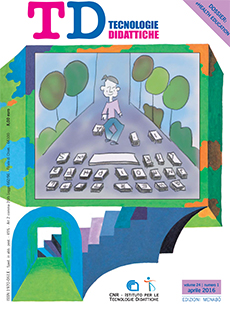Il Fascicolo Sanitario Elettronico: uno strumento per la formazione continua in medicina
Contenuto principale dell'articolo
Abstract
Un modello di formazione continua in medicina basato sull’utilizzo di funzionalità di comunicazione e cooperazione integrate nel Fascicolo Sanitario Elettronico.
Dettagli dell'articolo
Sezione
Gli autori che pubblicano su questa rivista accettano le seguenti condizioni:
- Gli autori mantengono i diritti sulla loro opera e cedono alla rivista il diritto di prima pubblicazione dell'opera, contemporaneamente licenziata sotto una Licenza Creative Commons CC BY 4.0 Attribution 4.0 International License.
- Gli autori possono aderire ad altri accordi di licenza non esclusiva per la distribuzione della versione dell'opera pubblicata (es. depositarla in un archivio istituzionale o pubblicarla in una monografia), a patto di indicare che la prima pubblicazione è avvenuta su questa rivista.
- Gli autori possono diffondere la loro opera online (es. in repository istituzionali o nel loro sito web) prima e durante il processo di submission, poiché può portare a scambi produttivi e aumentare le citazioni dell'opera pubblicata (Vedi The effect of Open Access).
Riferimenti bibliografici
Abidi, S.S.R. (2008). Healthcare Knowledge Management: The Art of the Possible. Proceedings of the 2007 Conference on Knowledge management for health care procedures, 4924, (1-20). Berlin, DE: Springer Verlag.
Allegra, M., Messineo, L., Migliore, Alessi, N. (2009). Towards new training models of “Continuing Medical Education in Italy”. Proceedings of the 2nd International Conference of Education, Research and Innovation, Madrid, ES, 880-886.
Bloom, B.S. (2005). Effects of continuing medical education on improving clinical care and patient health: a review of systematic reviews. International Journal of Technology Assessment in Health Care, 21(3), 380-385.
Candy, P.C. (1991). Self-Direction for Lifelong Learning: A Comprehensive Guide to Theory and Practice. San Francisco, Calif: Jossey-Bass Publishers.
Cantillon, P., Jones, R. (1999). Does continuing medical education in general practice make a difference? BMJ, 318(7193), 1276-9.
Davis, D.A. (1998). Does CME work? An analysis of the effect of educational activities on physician performance or health care outcomes. The International Journal of Psychiatry in Medicine, 28(1), 21-39.
Davis, D., O’Brien, M.A.T., Freemantle, N., Wolf, F.M., Mazmanian, P., Taylor-Vaisey, A. (1999). Impact of Formal Continuing Medical Education. JAMA, 282(9), 867. doi:10. 1001/jama.282.9.867
Davis, D., Galbraith, R. (2009). Continuing medical education effect on practice performance: effectiveness of continuing medical education: American College of Chest Physicians Evidence-Based Educational Guidelines. Chest, 135(Suppl. 3), 42S-48S. doi:10. 1378/chest.08.2517
Forsetlund, L., Bjørndal, A., Rashidian, A., Jamtvedt, G., O’Brien M.A., Wolf F.M., … Oxman A.D. (2009). Continuing education meetings and workshops: effects on professional practice and health care outcomes. Cochrane Database of Systematic Reviews, 2(CD003030).
Grimshaw, J.M., Eccles, M.P., Walker, A.E. (2002). Changing physicians’ behavior: what works and thoughts on getting more things to work. Journal of Continuing Education in the Health Professions, 22, 237-243.
Häyrinen, K., Saranto, K., & Nykänen, P. (2008). Definition, structure, content, use and impacts of electronic health records: a review of the research literature. International Journal of Medical Informatics, 77(5), 291–304. doi:10. 1016/j.ijmedinf.2007.09.001
Knowles, M.S. (1970). The Modern Practice of Adult Education: Andragogy Versus Pedagogy. New York, NY: New York Association Press.
Mansouri, M., Lockyer, J. (2007). A meta-analysis of continuing medical education effectiveness. Journal of Continuing Education in the Health Professions, 27(1), 6-15.
Marinopoulos, S.S., Dorman, T., Ratanawongsa, N., Wilson, L.M., Ashar, B.H., Magaziner, J.L., Miller, R.G., Thomas, P.A., Prokopowicz, G.P., Qayyum, R., Bass, E.B. (2007). Effectiveness of continuing medical education. Rockville, MD, USA: Agency for Healthcare Research and Quality. Evidence Report/Technology Assessment, 149.
Mazmanian, P.E., Davis, D.A. (2002). Continuing medical education and the physician as a learner: guide to the evidence. JAMA, 288(9), 1057-1060.
Mazmanian, P.E., Davis, D.A, Galbraith, R. (2009). Continuing medical education effect on clinical outcomes: effectiveness of continuing medical education: American College of Chest Physicians Evidence-Based Educational Guidelines. Chest, 135(3), 49S-55S. doi:10.1378/chest.08-2518
O’Brien, M.A., Freemantle, N., Oxman, A.D., Wolf, F., Davis, D.A., Herrin, J. (2001). Continuing education meetings and workshops: effects on professional practice and health care outcomes. Cochrane Database of Systematic Reviews, 1.
Peck, C., Mccall, M., Mclaren, B., & Rotem, T. (2000). Continuing medical education and continuing professional development: international comparisons, BMJ: British Medical Journal, 320(7232), 432-5.
Satterlee, W.G., Eggers, R.G., Grimes, D.A. (2008). Effective medical education: insights from the Cochrane Library. Obstetrical and Gynecological Survey, 63(5), 329-333.

